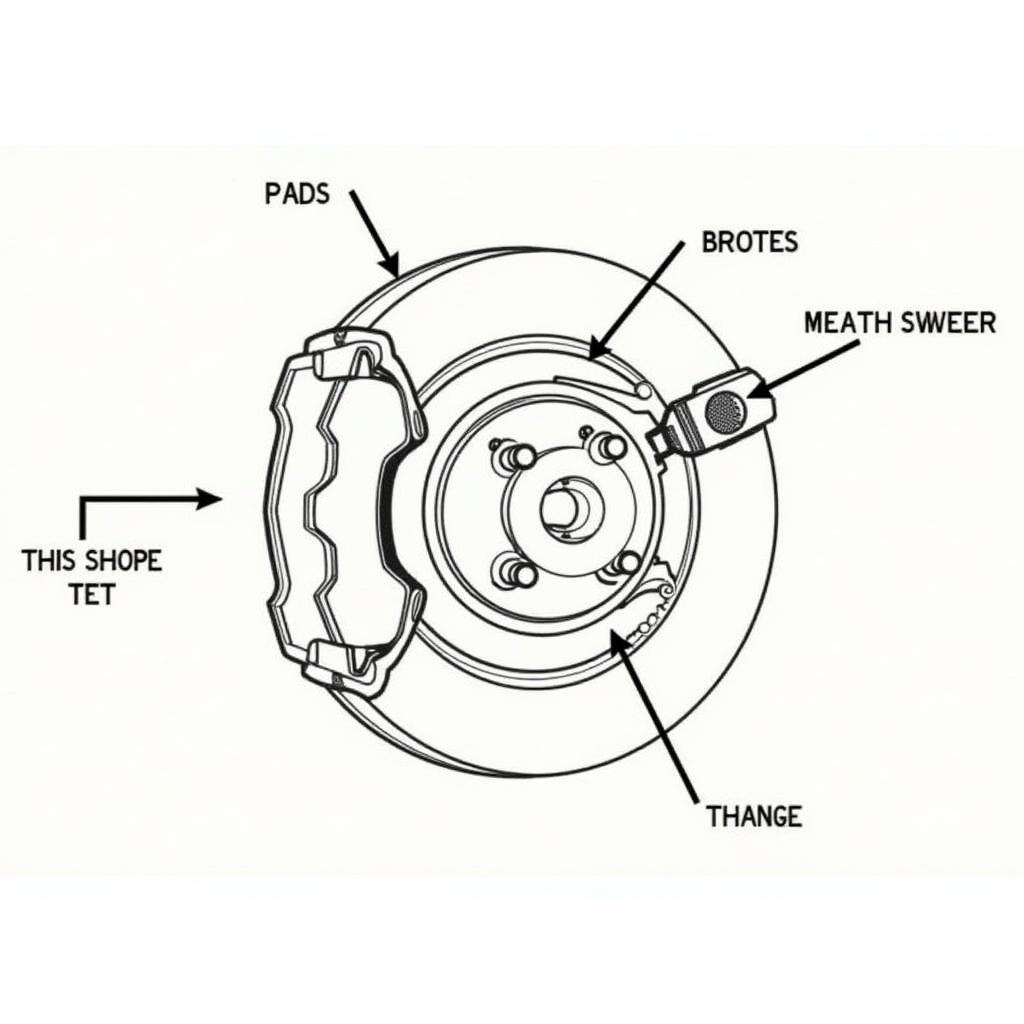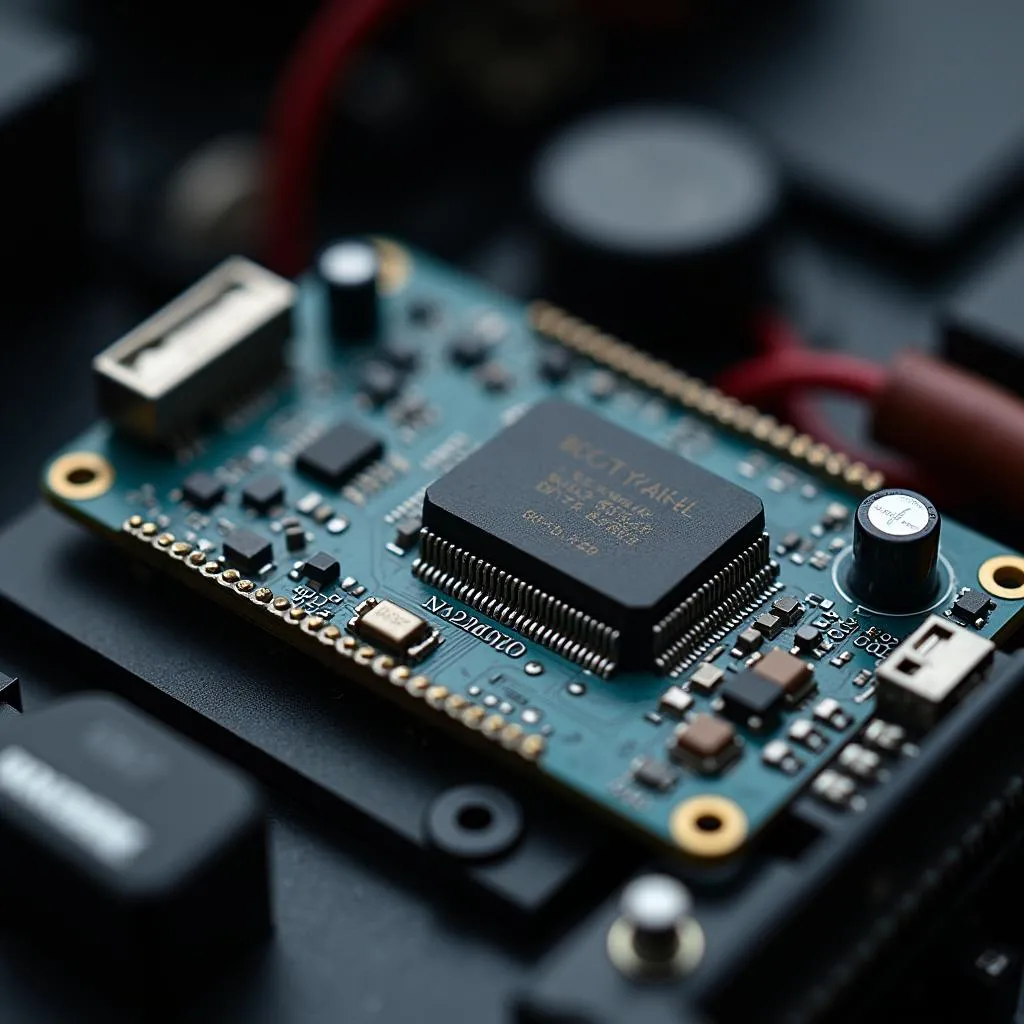That annoying squealing, grinding, or clicking coming from your brakes? It’s likely the dreaded auto brake wear warning sound, a signal that demands your immediate attention. This sound isn’t just an inconvenience; it’s a critical safety alert indicating potential problems with your braking system. Ignoring it could lead to costly repairs or even dangerous driving situations.
 Diagram of Brake System Components Triggering Warning Sound
Diagram of Brake System Components Triggering Warning Sound
What Causes the Auto Brake Wear Warning Sound?
The most common culprit is worn brake pads. Brake pads are designed with a small metal indicator that makes contact with the rotor when the pad material wears thin. This contact creates the high-pitched squeal or grinding noise, alerting you that it’s time for a brake job. However, other factors can contribute to this sound:
- Worn or damaged rotors: Grooves or warping in the rotors can also produce a scraping sound, often mistaken for worn brake pads.
- Faulty brake calipers: A sticking caliper can cause continuous contact between the pads and rotor, leading to excessive wear and noise.
- Loose or damaged brake hardware: Rattles, clicks, or clunks could indicate loose components in the brake assembly.
- Environmental factors: Rust or debris between the pads and rotors can cause temporary noise, especially after driving in wet or muddy conditions.
How to Diagnose the Problem
Diagnosing the exact cause of the auto brake wear warning sound requires a systematic approach. Here’s a step-by-step guide:
- Listen carefully to the sound: Is it a squeal, grind, click, or something else? The type of sound can provide clues about the underlying issue.
- Inspect your brake pads: Check the thickness of the brake pads through the wheel spokes. If they appear thin or you can see the metal indicator, they need to be replaced.
- Check your rotors: Look for signs of wear, such as grooves or scoring. Warped rotors may also cause a pulsating feeling in the brake pedal.
- Inspect brake calipers and hardware: Look for leaks, damage, or loose components.
If you’re unsure, warning signs of bad brakes can provide additional guidance.
What to Do When You Hear the Warning Sound
Ignoring the auto brake wear warning sound is dangerous. Addressing the issue promptly can prevent further damage and ensure your safety on the road. Here’s what you should do:
- Schedule a brake inspection: A qualified mechanic can diagnose the problem accurately and recommend the necessary repairs. corolla auto brake wear warning sound offers specific information for Toyota Corolla owners.
- Replace worn brake pads and rotors: If the pads are worn, it’s generally recommended to replace the rotors as well for optimal braking performance.
- Address other issues: Repair or replace any damaged calipers, hardware, or other components as needed.
Don’t wait until it’s too late. Addressing brake problems early can save you money and keep you safe. dashboard warning lights brake explains other brake-related warning signals you should be aware of.
Why is my car making a grinding noise when braking?
A grinding noise usually indicates metal-on-metal contact, likely from severely worn brake pads.
What does a squealing sound mean?
Squealing can be caused by worn brake pads, glazed rotors, or even environmental factors.
Can I drive with the auto brake wear warning sound?
It’s not recommended. Continued driving can damage the rotors and other brake components.
How much does it cost to fix the auto brake wear warning sound?
The cost depends on the specific issue and your vehicle. Replacing brake pads and rotors is a common repair.
Remember, a functioning braking system is crucial for your safety. Addressing the auto brake wear warning sound immediately ensures your vehicle’s stopping power and prevents more extensive, costly repairs down the road. For further information on brake warning indicators, you can refer to this resource: brake warning indicator sound. If you’re experiencing parking brake issues, particularly with an ML350, check out this helpful guide: ml350 parking brake warning. Don’t delay, take action today.

